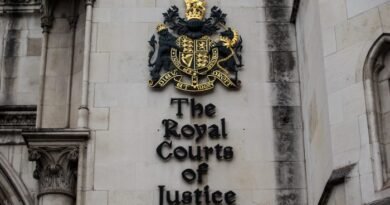US Victims and Families Alleges Iranian Involvement in Oct. 7 Hamas Terrorist Attack on Israel in New Legal Action
The Iranian government has expressed its moral support for the Hamas attack but has denied any direct involvement.
Three families of U.S. citizens killed or taken hostage in the Oct. 7 attack by the Hamas terrorist group on Israel have filed a federal lawsuit against the Binance cryptocurrency exchange, and the governments of Syria and Iran, accusing them of providing financial and material support for terrorism.
Lawsuit Disputes Iranian Denials
The lawsuit seeks damages against the Iranian and Syrian governments under a U.S. law that creates a cause for action against a foreign government when it is accused of sponsoring or engaging in acts of terrorism that cause injuries to U.S. citizens.
The Iranian government has expressed moral support for the Oct. 7 attack but has denied any direct involvement. In an Oct. 8 statement, the Iranian mission to the United Nations said, “We emphatically stand in unflinching support of Palestine; however, we are not involved in Palestine’s response, as it is taken solely by Palestine itself.“ Iran’s Ministry of Foreign Affairs described the Hamas attacks as a ”spontaneous” event.
Although Iran has denied having a direct role in planning or providing support for the Oct. 7 attack, the lawsuit notes the U.S. government has continuously designated the Iranian government as a state sponsor of terrorism since 1984, three years before Hamas was founded in 1987.
“Iran consistently and continuously provided funding to Hamas in the amount of a hundred million U.S. dollars each year for the purpose of allowing Hamas to buy weapons and pay its terrorist fighters and otherwise carry out its terrorist operations,” the complaint reads. “A substantial amount of such funding was in the form of cryptocurrency, and it was as such for the purpose of evading sanctions implemented by the United States.”
Though Iran has denied direct involvement in preparing Hamas terrorists to carry out the Oct. 7 attack, the complaint insists to the contrary that Iran “facilitated, planned, and organized” the attacks and coordinated with Hamas gunmen on Oct. 7 “via a joint military center established in Beirut, Lebanon.”
The lawsuit similarly noted the United States has designated the Syrian government as a state sponsor of terror since 1979. The lawsuit doesn’t assert direct Syrian government involvement in the Oct. 7 attack but does say the Syrian government has provided financial, military, and logistical support to Hamas over the years, including by providing an amphetamine drug to Hamas terrorists called Captagon, which the lawsuit asserts was used by Hamas terrorists, leading them to torture and murder their victims in an intoxicated state. Captagon is a psychostimulant that boosts concentration and physical performance as well as aggression.
NTD News reached out to the Iranian and Syrian missions to the United Nations but did not receive responses from either government before press time.
Crypto Exchange Faces Liability
The lawsuit asserts three separate but similar causes of action against the Binance cryptocurrency exchange and its co-founder and former CEO Changpeng Zhao.
The three causes of action all assert Binance and Mr. Zhao aided Hamas and another U.S.-designated terrorist organization, Palestinian Islamic Jihad (PIJ), by allowing the groups to maintain accounts and make financial transactions through the cryptocurrency exchange, benefitting the groups, their leaders, and front organizations.
Mr. Zhao pled guilty in November to federal money-laundering charges and agreed to step down from the company and pay a $50 million fine.
Binance also admitted in November to facilitating money laundering and sanctions violations and agreed to pay more than $4 billion in fines. According to the U.S. Treasury Department, Binance’s violations in this criminal case included failing to implement programs to prevent or report suspicious transactions on behalf of designated terrorist organizations, including Hamas, PIJ, Al Qaeda, and ISIS.
The plaintiffs in the New York civil lawsuit cite the November Binance settlement and findings of fact from that criminal case to bolster their claims for financial compensation stemming from the injuries and emotional toll they endured as a result of the Oct. 7 attack in Israel.
NTD News reached out to Binance for comment on this new lawsuit but did not receive a response by press time.






